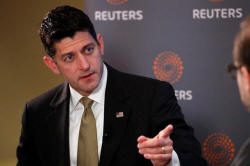Ryan says Republican tax plan must speed through choppy
waters: Reuters interview
 Send a link to a friend
Send a link to a friend
 [October 26, 2017]
By David Morgan [October 26, 2017]
By David Morgan
WASHINGTON (Reuters) - U.S. House of
Representatives Speaker Paul Ryan said on Wednesday that a sweeping
Republican tax-cut plan is entering its toughest phase yet as lobbyists
swarm Congress to try to protect valuable tax breaks.
Urging lawmakers to move quickly on the plan, Ryan said in an interview
with Reuters that speedy action would prevent the legislation getting
bogged down and deliver sooner the economic growth that Republicans
expect from it.
"K Street," as Washington's lobbying industry is known after the
downtown street where much of it is based, will soon descend on Capitol
Hill to defend tax benefits for companies and other special interests,
said Ryan, the top Republican in Congress.
"When the details come, that is when you’re going to see K Street coming
to Congress. And that’s why this hasn’t been done for 31 years,” said
Ryan, looking back to the country's last major tax code overhaul under
President Ronald Reagan in 1986.

While the broad parameters of the Republican plan, backed by President
Donald Trump, have been made public, detailed legislation is not
expected to be revealed until next week.
Securing passage by Congress of the tax plan would give Trump his first
major legislative win since he took office in January. Republicans
control the White House and both chambers of Congress and are under
pressure to deliver on their election campaign promises. Final action on
taxes is at least weeks away.
The Republican plan would cut taxes for businesses and people by up to
$6 trillion over the next decade, according to independent analysts.
It calls for reducing the corporate income tax rate to 20 percent from
35 percent and setting a lower rate for smaller businesses, as well as
cutting taxes for individuals and allowing larger deductions for
families.
Democrats have called it a gift to the rich and to corporate America
that would cause the federal deficit to balloon and add to the $20
trillion U.S. national debt.
CHOPPY WATERS
Ryan referred to white-water rafting to describe how the tax overhaul
effort is entering its toughest phase.
"We’ve been going through Class 3 rapids, which is a pleasant ride. It’s
nice. Everybody pretty much stays in the boat and it’s pretty good. But
we’re about to go through Class 5 rapids, which is the biggest rapid you
can go through," he said.

He called on Republicans to hold tight as details are hammered out.
"We’ve got to make sure that everybody stays in the boat and we get the
boat down the river," Ryan said.
He dismissed concerns that tax cuts could expand the federal deficit.
"We don't anticipate a big deficit effect from this tax reform because
we will broaden the base and lower the rates, plug loopholes and get
faster economic growth."
Republicans intend to pay for their proposed cuts in part by broadening
the tax base. That would require discarding trillions of dollars of tax
deductions, loopholes and other breaks, each one protected by powerful
interests.
If lobbyists succeed in protecting such tax breaks, lawmakers would be
looking at less revenue to offset the tax cuts, raising the risk of
higher deficits and debt that could undermine long-term economic growth.
[to top of second column] |

U.S. House Speaker Paul Ryan (R-WI) participates in an onstage
interview about tax policy with Thomson Reuters Editor in Chief
Stephen Adler in Washington, U.S. October 25, 2017. REUTERS/Jonathan
Ernst

DEMOCRATIC SUPPORT?
Ryan has previously said he wants the House to pass the tax bill by the Nov. 23
U.S. Thanksgiving holiday. He predicted on Wednesday that some Democratic
lawmakers would back the tax plan.
"At the end of the day, I do believe some Democrats will end up voting for this
thing," Ryan said. "It's hard for me to see why - no matter what party you're
from - you'd want to vote against this."
At least some Democratic support could end up being needed in the Senate, where
Republicans hold only a 52-48 majority. Party dissent in the Senate led to
Republicans' failure this summer to push through an overhaul of the healthcare
system that Trump and the party leadership had pushed for.
Ryan, from Wisconsin, blamed Democrats for the lack of bipartisanship in
Washington. Republicans are drafting the tax legislation on their own.
“I so wish we had Bill Bradley Democrats around these days. We do not have Bill
Bradley Democrats. Believe me, I really, really wish we did,” Ryan said,
referring to Democratic former Senator Bill Bradley, who played a key bipartisan
role in the Reagan tax reform.
Among Republicans, skirmishes around the tax breaks have already begun.

Some Republican lawmakers are resisting a proposal to eliminate a popular
deduction for state and local tax payments, which would hit middle-class voters
in high-tax states like New York, New Jersey and California.
“You do have to broaden the base in order to lower the rates. And that is what
reform is,” Ryan said. “With respect to state and local, I think there’s a way
of addressing the concerns that our members have for middle income taxpayers …
so that they are net winners in tax reform as well.”
Ryan also said Republican lawmakers will not take up a bipartisan plan to
stabilize Obamacare insurance markets or try again this year to repeal and
replace former President Barack Obama's Affordable Care Act.
The House speaker said he wants Congress to pass legislation to protect illegal
immigrants brought to the United States as children but offered no timetable.
Asked about strong denunciations of Trump this week by two Republican senators,
Ryan said people should "settle their differences personally" rather than in
public.
He also urged the Department of Justice to immediately give Congress documents
related to the funding of a dossier on Trump during the presidential campaign.
(Reporting by David Morgan, Amanda Becker and Doina Chiacu; Writing by Susan
Heavey and Alistair Bell; Editing by Kevin Drawbaugh, Will Dunham and Frances
Kerry)
[© 2017 Thomson Reuters. All rights
reserved.] Copyright 2017 Reuters. All rights reserved. This material may not be published,
broadcast, rewritten or redistributed.
 |